Interviewed by Joel Meyers
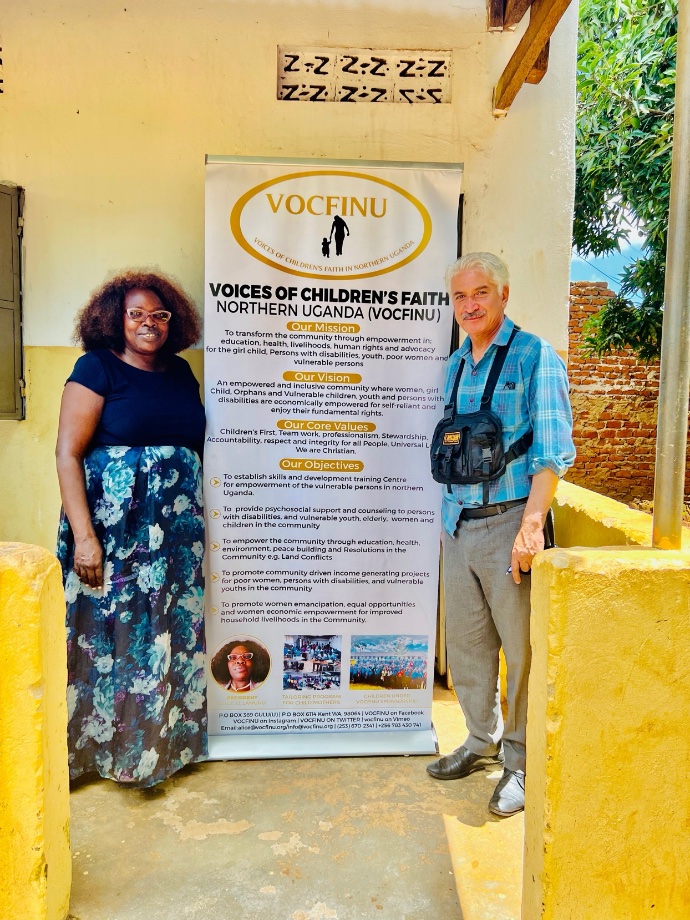
VOCFINU Executive Director Alice Lamunu with Dr. Foushanji in Uganda. Photo: VOCFINU
Voices of Children’s Faith in Northern Uganda, or VOCFINU, a GlobalWA member since 2020, is dedicated to uplifting Northern Uganda’s vulnerable populations, especially children, women, and adolescents affected by poverty and post-war hardships. Their holistic approach addresses the immediate needs of education, healthcare, and skills development to create pathways out of poverty and toward sustainable, empowered communities.
We had the opportunity to sit and talk with Alice Lamunu, founder and Executive Director VOCFINU, and discussed her roots, why she invested her own funds to start VOCFINU, why the education of women and girls’ matter, her early influencers, and more.
What is your role in VOCFINU?
I’m the founder and executive director of VOCFINU. VOCFINU stands for Voices of Children’s Faith in Northern Uganda. I’ve been responsible for initial funding, to get the organization of the ground. This could mean applying for grants or using our own personal assets to fund the initial organizational costs until the organization begins earning enough revenue to cover the cost. As founder and executive director, I oversee the relationship between the board members and the organization, and leading and managing the organization.
My work is very important to create a vision in order to provide unity within the organization. I must make sure coworkers understand the vision and are inspired by it.
The most significant part of my job includes outlining all the tasks that need to be fulfilled in the organization and referring back to the vision in order to help complete the task. What’s being fulfilled; what tasks are not being fulfilled? What new activities or tasks need to be redefined or changed to effectively engage the community?
My work is also invested in building relationships with both the outside community and with the population that VOCFINU is targeting. Promoting awareness of the organization to outside communities is essential in recruiting donors and volunteers in order to help assist the organization with poverty alleviation. We are trying to break [Ugandan] communities out of the cycle of poverty by the skilling of girls – to strengthen the economic wellness of the child mother.
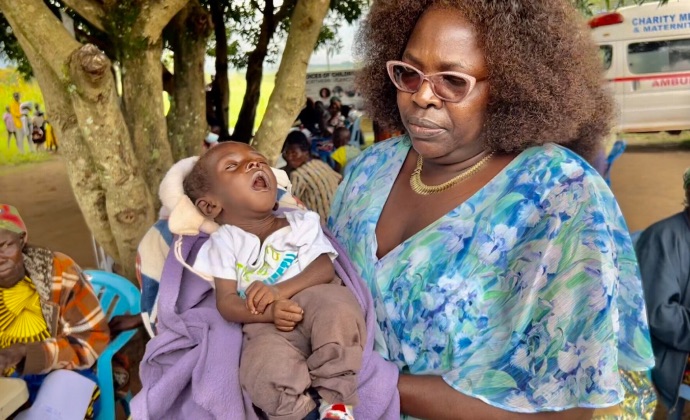
Alice Lamunu in Uganda medical camp; free treatment for vulnerable in rural communities. Photo: VOCFINU
What is the string of events that brought you to this (impactful) moment in your life – what are the motivators that cause you to do what you do?
Growing up in a rural community in northern Uganda, I witnessed firsthand the challenges faced by women and girls, including limited access to education, healthcare, and economic opportunities. My aunty, who is a widow and a strong and determined woman, inspired me to pursue my education and make a difference in my community.
These experiences deepened my understanding of the complexities of gender inequality and motivated me to dedicate my career to empowering women and girls. My motivators are the women and girls I meet every day who are struggling to overcome obstacles and achieve their dreams. Their resilience and determination inspire me to work harder and make a greater impact.
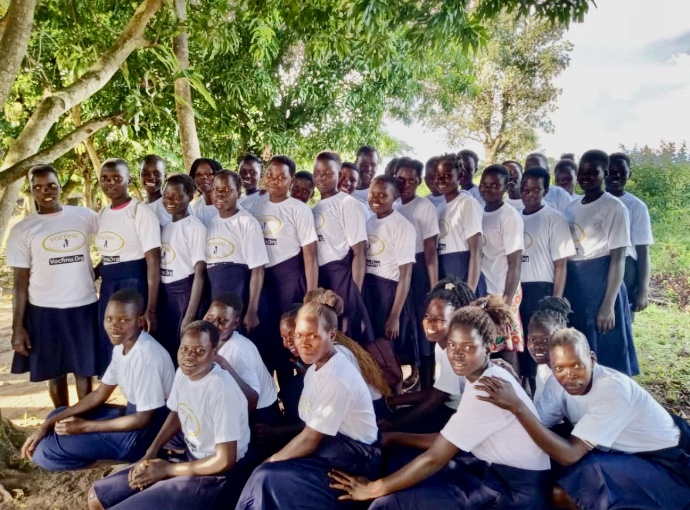
Girls in VOCFINU sponsored programs. Photo: VOCFINU
Who are your early influencers?
My early influencers include my mother and aunty, who taught me the importance of education and hard work, and my grandmother, who showed me the value of community and social responsibility. Additionally, I have been inspired by the work of organizations like the Global Fund for Women and the African Women’s Development Fund, which have demonstrated the power of investing in women and girls to drive social change.
Why do you focus on empowering girls and women in Uganda?
I focus on empowering girls and women in Uganda because they are disproportionately affected by poverty, inequality, and social injustice. In Uganda, women and girls face significant barriers to education, healthcare, and economic opportunities, which perpetuate cycles of poverty and limit their potential. By empowering girls and women, we can break these cycles and create a more just and equitable society. Uganda is also a country with a high population growth rate, and investing in girls and women is critical to ensuring the country’s future prosperity and stability.
What do you see as the biggest barriers to achieving gender equality?
In my experience, the biggest barriers to achieving gender equality include cultural and social norms that perpetuate discrimination and inequality, limited access to education and economic opportunities, and inadequate healthcare and social services. Additionally, the lack of representation and participation of women in decision-making positions and the prevalence of violence against women and girls are significant barriers to achieving gender equality.
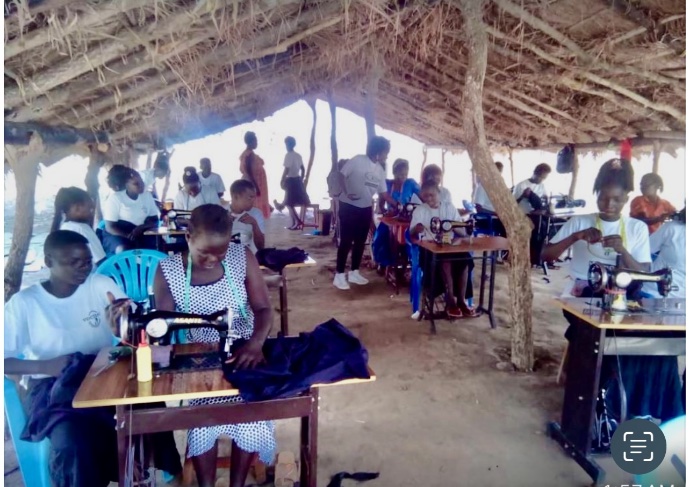
VOCFINU empowers child mothers , women and families who are In extreme poverty with skills training, they need for long-term personal and economic success to support their children and themselves. Photo: VOCFINU
I also see you work in King County – please describe this work.
While my primary focus is on empowering women and girls in Uganda, I also work with partners in King County to support refugee and immigrant women who have been affected by conflict and displacement. This work involves providing parental and childcare support, cultural orientation, language training, and job skills to help these women and their spouses integrate into their new communities and achieve economic self-sufficiency. I also collaborate with local organizations to advocate for policies and programs that support the needs of refugee and immigrant women and girls.
What are the biggest challenges facing you right now to meet your mission goals?
The biggest challenges facing me right now include securing sufficient funding to support our programs, navigating the complexities of working in a rural and resource-constrained environment in Uganda, and addressing the ongoing needs of women and girls in refugee settlements and host communities. Additionally, I face challenges in building and maintaining partnerships with local organizations and stakeholders, and in ensuring the long-term sustainability of our programs.
What do you consider to be your biggest accomplishment(s)?
Through our sponsorship program, we have offered quality education for vulnerable and disadvantaged girls, who have been caught in poverty in northern Uganda, enabling their educational completion/attainment at various levels including: primary school by over 350 girls, college diplomas
(talented girls and boys recently completed healthcare training in nursing and midwifery, and pharmacy), and the alleviation of poverty among 300 rural women through our livelihood programs. I am also proud of the psychosocial support and healthcare services we have provided to over 2000 community members affected by conflict and diseases.
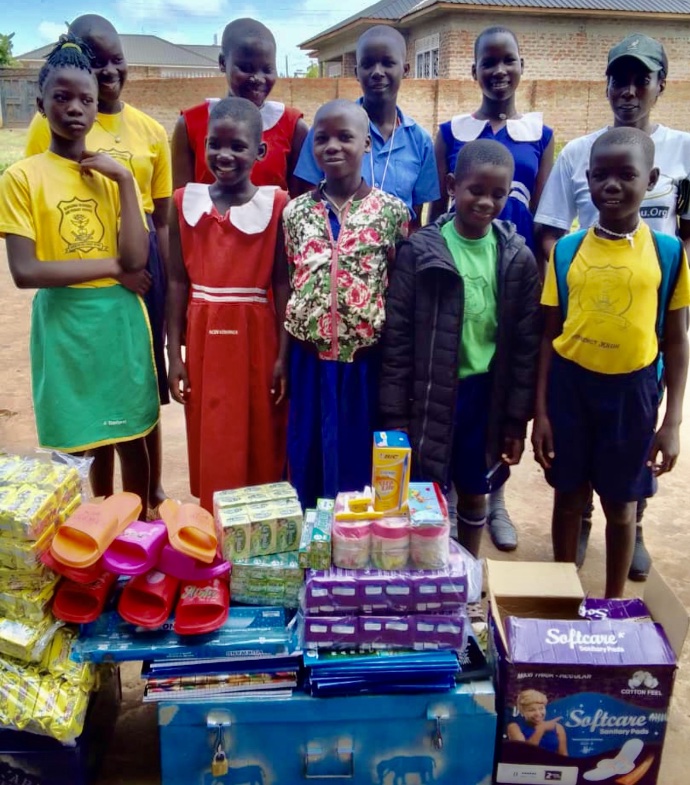
VOCFINU provides children with back to school supplies. Photo: VOCFINU
What do you strive to achieve with your efforts?
I hope to achieve a future where women and girls in Uganda have equal access to education, healthcare, and economic opportunities, and where they are able to live free from violence and discrimination. I envision a future where women and girls are empowered to make their own decisions and shape their own destinies, and where they are able to contribute fully to the development of their communities and country.
What’s next for you? What’s your vision for the near and far future?
What’s next for us is to continue to build on our successes and to address the challenges that we face. We are currently seeking funding and support to expand our programs and to increase our impact, including within the refugee settlements in northern Uganda. We are also looking to build new partnerships and to engage with new stakeholders who share our vision and our commitment to empowering girls and women in northern Uganda.